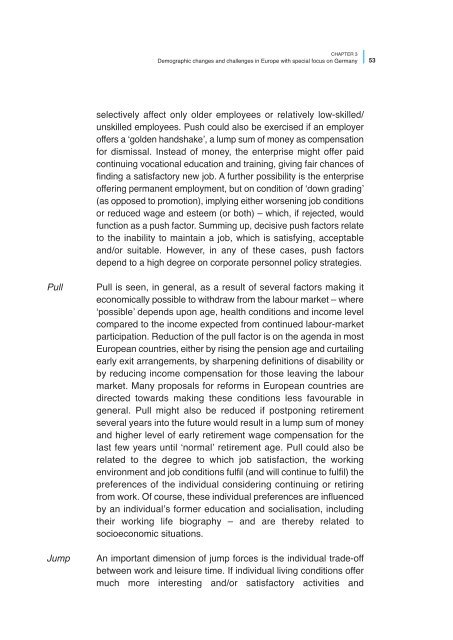Working and ageing - Cedefop - Europa
Working and ageing - Cedefop - Europa
Working and ageing - Cedefop - Europa
You also want an ePaper? Increase the reach of your titles
YUMPU automatically turns print PDFs into web optimized ePapers that Google loves.
CHAPTER 3<br />
Demographic changes <strong>and</strong> challenges in Europe with special focus on Germany 53<br />
selectively affect only older employees or relatively low-skilled/<br />
unskilled employees. Push could also be exercised if an employer<br />
offers a ʻgolden h<strong>and</strong>shakeʼ, a lump sum of money as compensation<br />
for dismissal. Instead of money, the enterprise might offer paid<br />
continuing vocational education <strong>and</strong> training, giving fair chances of<br />
finding a satisfactory new job. A further possibility is the enterprise<br />
offering permanent employment, but on condition of ʻdown gradingʼ<br />
(as opposed to promotion), implying either worsening job conditions<br />
or reduced wage <strong>and</strong> esteem (or both) – which, if rejected, would<br />
function as a push factor. Summing up, decisive push factors relate<br />
to the inability to maintain a job, which is satisfying, acceptable<br />
<strong>and</strong>/or suitable. However, in any of these cases, push factors<br />
depend to a high degree on corporate personnel policy strategies.<br />
Pull Pull is seen, in general, as a result of several factors making it<br />
economically possible to withdraw from the labour market – where<br />
ʻpossibleʼ depends upon age, health conditions <strong>and</strong> income level<br />
compared to the income expected from continued labour-market<br />
participation. Reduction of the pull factor is on the agenda in most<br />
European countries, either by rising the pension age <strong>and</strong> curtailing<br />
early exit arrangements, by sharpening definitions of disability or<br />
by reducing income compensation for those leaving the labour<br />
market. Many proposals for reforms in European countries are<br />
directed towards making these conditions less favourable in<br />
general. Pull might also be reduced if postponing retirement<br />
several years into the future would result in a lump sum of money<br />
<strong>and</strong> higher level of early retirement wage compensation for the<br />
last few years until ʻnormalʼ retirement age. Pull could also be<br />
related to the degree to which job satisfaction, the working<br />
environment <strong>and</strong> job conditions fulfil (<strong>and</strong> will continue to fulfil) the<br />
preferences of the individual considering continuing or retiring<br />
from work. Of course, these individual preferences are influenced<br />
by an individualʼs former education <strong>and</strong> socialisation, including<br />
their working life biography – <strong>and</strong> are thereby related to<br />
socioeconomic situations.<br />
Jump An important dimension of jump forces is the individual trade-off<br />
between work <strong>and</strong> leisure time. If individual living conditions offer<br />
much more interesting <strong>and</strong>/or satisfactory activities <strong>and</strong>

















